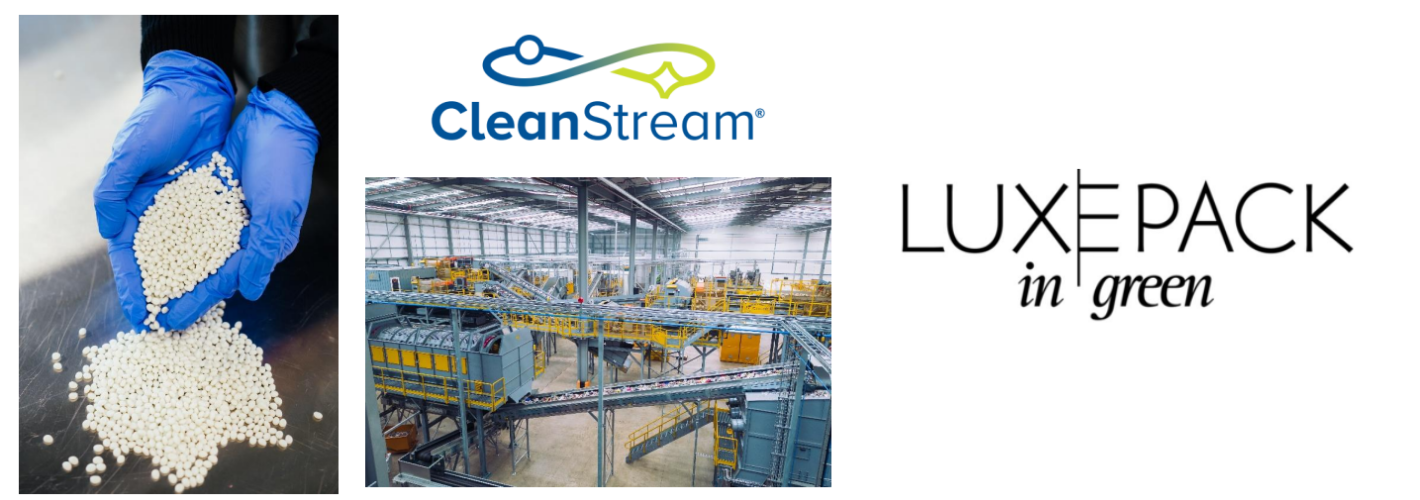Friday, September 26, 2025
CleanStream® by AMCOR: a major breakthrough in PP recycling for contact-sensitive applications

CleanStream® mechanically processes polypropylene (PP) from locally collected household waste into packaging for contact-sensitive applications.
Artificial intelligence technology enables high levels of polymer purity, allowing it to be incorporated at higher percentages in all types of packaging, particularly those requiring a high degree of aesthetics and/or functional performance, such as beauty and personal care products.
The CleanStream® production facility has the capacity to recycle nearly 40% of all PP waste collected in the UK, producing large-scale, low-carbon recycled plastic.
ENVIRONMENTAL IMPACT
Our Leamington Spa site can recycle nearly 40% of all collected and sorted PP waste in the United Kingdom.
Thanks to our global presence and partnerships with leading suppliers, we have secured access to 50,000 tons of kerbside-collected PP waste annually in the UK, equivalent to more than 1 billion individual packaging items, in order to meet our customers’ sustainability goals on a global scale.
Thanks to our global presence and partnerships with leading suppliers, we have secured access to 50,000 tons of kerbside-collected PP waste annually in the UK, equivalent to more than 1 billion individual packaging items, in order to meet our customers’ sustainability goals on a global scale.
A life-cycle analysis has shown that CleanStream® rPP generates around 70% fewer CO₂ emissions compared to virgin plastic, amounting to a reduction of about 50,000 tonnes of CO₂ annually.
This is equivalent to producing more than 2.5 million five-litre paint containers.
To date, CleanStream® has received a Letter of No Objection (LNO) from the U.S. Food and Drug Administration (FDA).
To date, CleanStream® has received a Letter of No Objection (LNO) from the U.S. Food and Drug Administration (FDA).
This confirms that the post-consumer recycled PP (PCR PP) produced by the process can be used with up to 100% recycled content in food contact applications in regions covered by the FDA.
Following this success, we are now pursuing European approvals for the use of the material in food packaging. In the meantime, FDA approval has created opportunities in Europe for other contact-sensitive applications, notably cosmetics and personal care.
PROJECT OBJECTIVE
With the emergence of regulations such as the Plastic Packaging Tax and PPWR, as well as growing consumer demand for sustainable packaging, brands have long been looking to develop solutions incorporating post-consumer recycled (PCR) plastic.
For products manufactured in PP, the challenge — particularly for contact-sensitive applications such as food and personal care — was to find PCR of sufficiently consistent high quality (physical properties, aesthetics, no odour, low carbon footprint) that was reliably available at scale.
The CleanStream® process was therefore designed to develop the world’s first closed-loop system capable of mechanically transforming household PP waste into packaging for contact-sensitive applications.
Through continuous testing of the recycled PP (rPP) produced and ongoing operational improvements, we increased production from 1,000 tonnes per month to 3,000 tonnes today, with a target of 4,000 tonnes per month by September 2025.
Our close partnerships with customers have also been essential, supporting their own testing to confirm the long-term effectiveness of the polymer and ensure it meets the requirements of their premium brands.
PROJECT INITIATION
Initial discussions focused on defining what the ideal PCR material should be, available at scale to meet the growing needs of businesses across the UK and Europe.
In addition to developing a high-quality PCR polymer, the aim was also to offset the approximately 50,000 tonnes/year of PP packaging that the company puts on the market, giving plastic multiple lives and keeping resources in circulation.
In addition to developing a high-quality PCR polymer, the aim was also to offset the approximately 50,000 tonnes/year of PP packaging that the company puts on the market, giving plastic multiple lives and keeping resources in circulation.
Our process adds value to waste PP through intensive sorting, washing and decontamination, without requiring additional investment in existing waste management infrastructure.
In the UK and Europe, no other facility is currently capable of transforming household PP waste into material suitable for contact-sensitive applications.
In the UK and Europe, no other facility is currently capable of transforming household PP waste into material suitable for contact-sensitive applications.
PROJECT IMPLEMENTATION
The development process was thorough in identifying key stages and appropriate solutions to achieve the required quality and consistency:
- Sorting to identify PP:
CleanStream® uses a sophisticated automated pre-sorting process integrating optical sensors and machine learning algorithms to identify and separate pots, tubs and trays (PTTs) with over 98% purity. - Sorting to identify food-grade PP:
Items must meet strict criteria (resin manufactured to food-grade specification, previous use in food contact). Materials are then washed, cleared of metals and separated by colour. White and natural items pass to the contact-sensitive line, while coloured items follow a traditional recycling process. - Extrusion and decontamination:
Hot washing, removal of inks and fats, optical flake sorting, extrusion, compounding, filtering and post-decontamination. The goal is to eliminate volatile and semi-volatile molecules, ensuring odourless and tasteless rPP. - Analytical testing:
Produced pellets are stored in silos for 24 hours and then analysed (extraction, headspace, GC-MS, GC-FID). Specific protocols can be created depending on customer requirements.
INVOLVEMENT
The skills and expertise of our employees have been essential:
- Knowledge of customer markets,
- Understanding of waste collection infrastructure,
- Technical expertise in recycling,
- Comprehensive training on the new system,
- Close partnerships with customers to validate PCR performance.
RESULTS
- Recycling capacity: nearly 40% of PP collected and sorted in the UK.
- Secured supply: access to 50,000 tonnes of PP waste/year (≈ 1 billion packs).
- Carbon reduction: -70% CO₂ emissions vs virgin plastic → 50,000 tCO₂ avoided annually.
- Production: scaled from 1,000 → 3,000 tonnes/month, target 4,000 by late 2025.
- Customers: already integrated into ranges from L’Oréal, Unilever, P&G, Beiersdorf.
- Applications: closures, dispensers, jars, applicators, technical parts.
Key advantage: CleanStream® works within existing waste management infrastructures, providing a reliable, scalable closed-loop solution for contact-sensitive packaging.